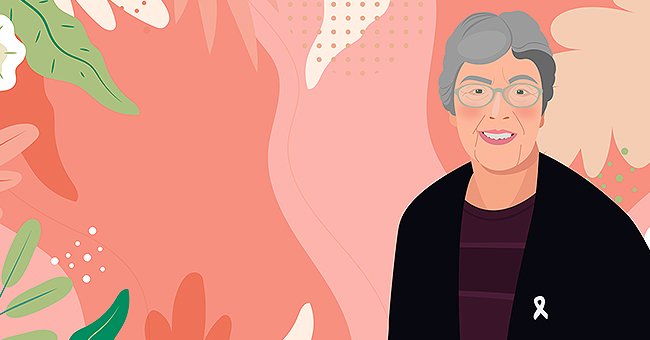
Women With Will: Cancer Thriver Ginny Mason on Learning to Live One Day at a Time
Even though being diagnosed with breast cancer is definitely frightening, it isn't always a death sentence. That is, in part, thanks to all the findings made by research organizations.
Things can get especially scary when women or men are diagnosed with inflammatory breast cancer (IBC), which, according to the National Cancer Institute, happens in only one to five percent of all breast cancer cases.
"Currently, 1/3 of IBC patients already have distant (metastatic) disease at diagnosis."
IBC is both rare and aggressive, and it is usually diagnosed at younger ages if compared with other types of breast cancer. Apart from that, African American women are more likely to develop the disease than White women.
There are still a lot of discoveries to make regarding IBC nowadays, and Ginny Mason knows it. Ginny, a registered nurse, was diagnosed with this uncommon form of breast cancer back in 1994.
Not only did she survive, but also helped create the Inflammatory Breast Cancer Research Foundation to help people who went or are going through treatment at the moment.
In our efforts to raise breast cancer awareness as part of AmoMama's #WomenWithWill project, we exclusively interviewed Ginny to learn more about her experience, why she helped create the foundation, and what we can do to help.
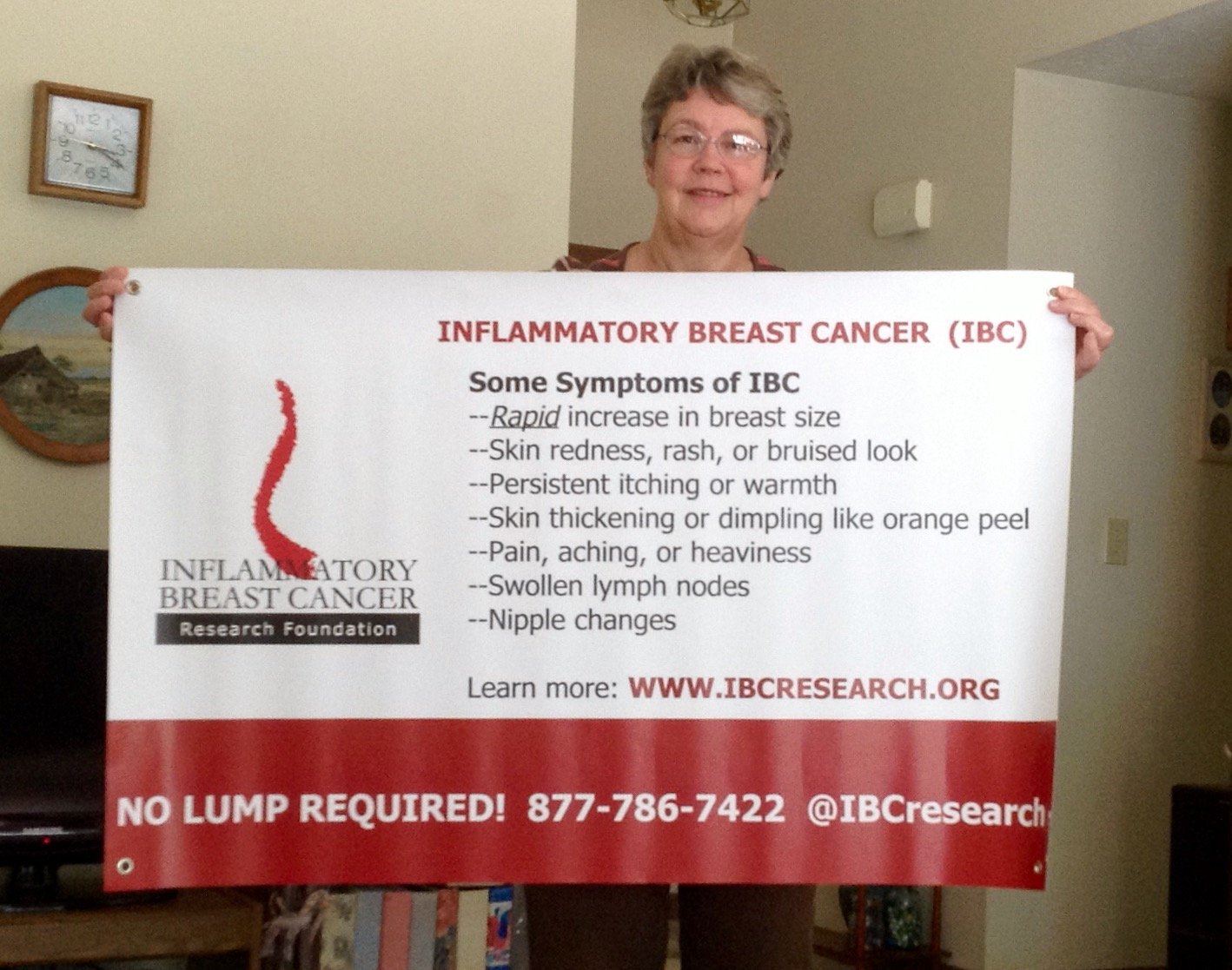
Ginny Mason from the Inflammatory Breast Cancer Research Foundation | Photo: Courtesy of Ginny Mason
You were diagnosed with inflammatory breast cancer in 1994. What were your first thoughts?
"At that time, I'd never heard of IBC, even though I'm a nurse. When the Dr. told me how serious it was, I found it hard to believe I didn't feel more 'sick.' I was just 40 when my symptoms started and 41 when I was diagnosed. I couldn't imagine my life was going to be so short."
How much information was known about this type of cancer back then? What research did you do and where did you look for the information?
"Remember, this was pre-internet time! I called the National Cancer Institute hotline, and they sent a sheet with just a couple of paragraphs listing a five-year survival of three percent. My only other resource was my doctors, and they'd only treated one other patient, who hadn't survived."
"My doctors consulted with physicians at the National Cancer Institute (NCI) for guidance, and they determined my care. In addition, one of my co-workers said her brother was in research at the NCI and had him call me.
He became a personal friend and was my second opinion over the years when I needed to discuss something regarding treatment."
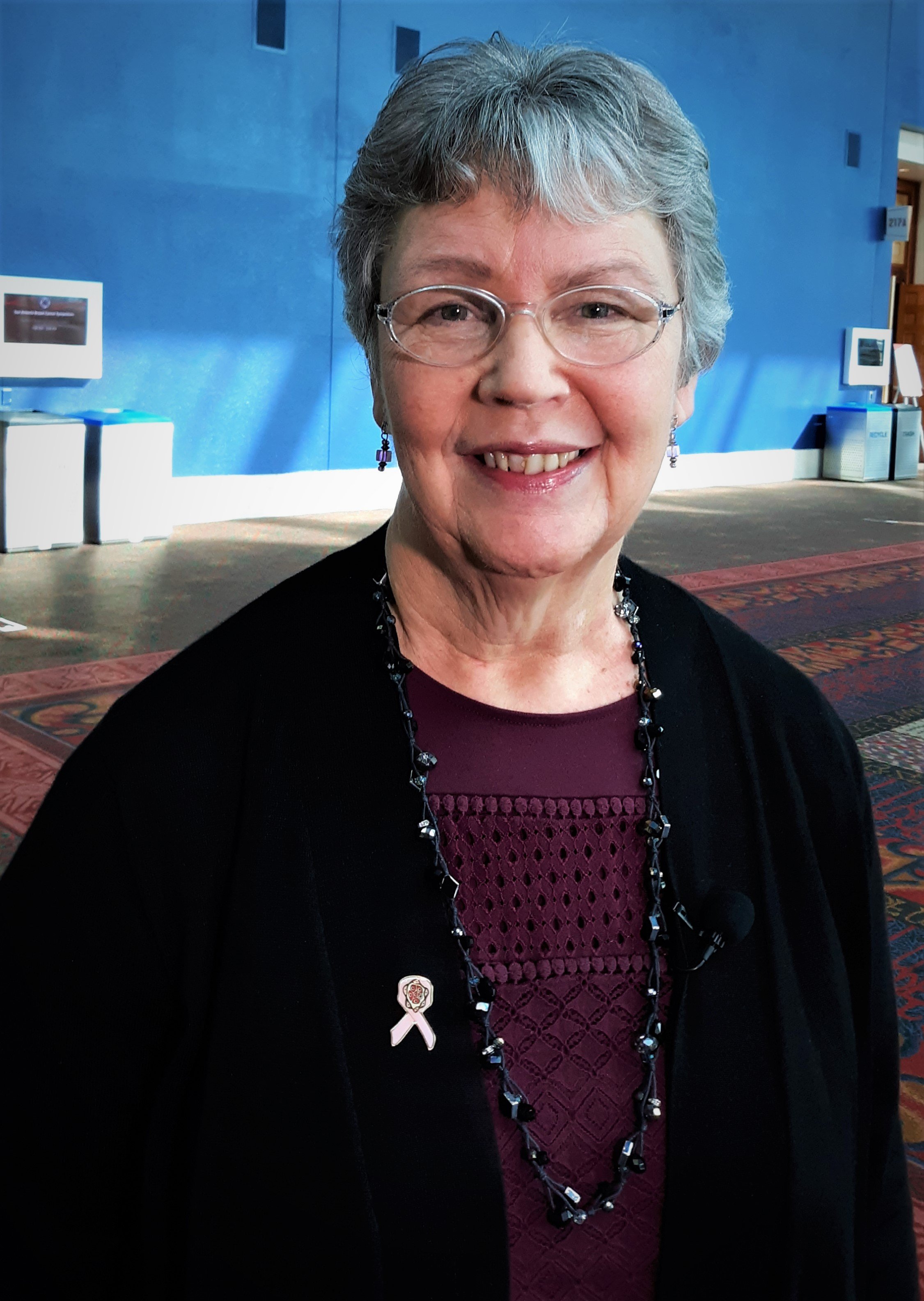
Cancer survivor Ginny Mason, head of the Inflammatory Breast Cancer Research Foundation
Did anyone in your family have cancer?
"One of my uncles had lung cancer in middle age. He was a heavy smoker, and I'd always figured that increased his risk. We couldn't find any other family members who'd had cancer before my diagnosis. Our daughter (and only child) was diagnosed with very aggressive, early-stage breast cancer nine years after my diagnosis. She's doing well."
How did you manage to beat cancer, and what was the most complicated thing to do while you were dealing with it?
"I hesitate to use the term 'beat cancer.' Cancer doesn't play fair, and one must always be diligent and pay attention to your body. I was reminded of that when just a few months ago, I was diagnosed with another, unrelated cancer. One of the challenges patients face during treatment is taking care of others."
"It's hard on your parents and other close family members. You find yourself trying to help them cope when so much of your energy is going toward getting through each day. I worked during treatment.
It was emotionally helpful by keeping my brain busy, and I think it helped my co-workers understand that you don't have to stop living just because you have cancer. I learned early on that I couldn't control what happened to me; I could only control how I responded."
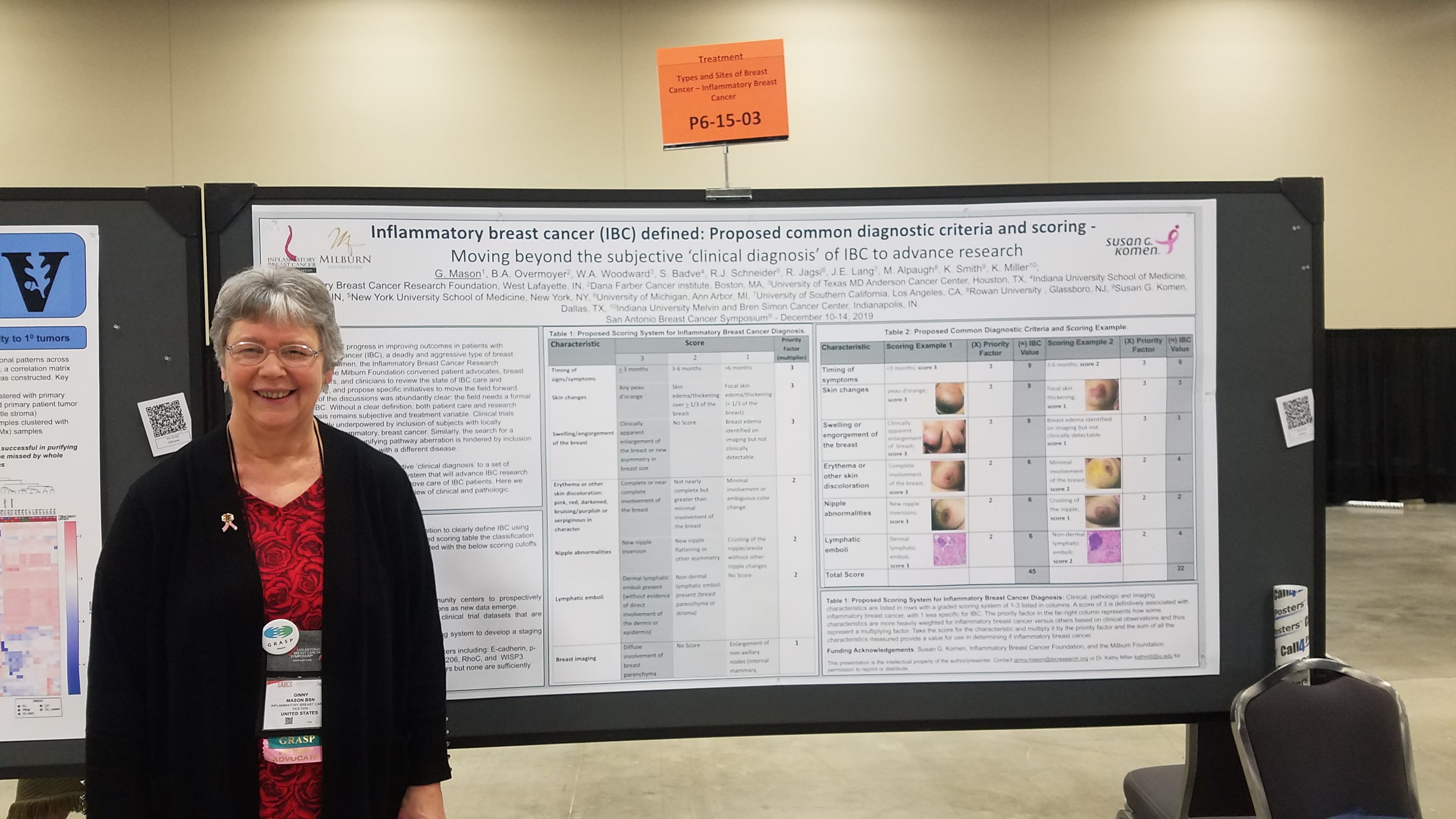
Cancer survivor Ginny Mason, head of the Inflammatory Breast Cancer Research Foundation
Who supported and helped you the most during that period?
"My husband has been my rock throughout! When we said 'for better or worse, sickness and health,' we meant it, and he's never wavered. Our oldest granddaughter was three months old the day I was diagnosed.
Her mother was finishing her senior year, newly married, and juggling a lot. It was therapeutic for me to sit and rock that baby who didn't care that I was bald or nauseous. She'd smile at me, and I was at peace. That 'baby' is now married with babies of her own!!
My co-workers at the mental health clinic, where I worked, were great support and my mother-in-law wrote to me regularly since she lived in another state. I had a huge basket filled with cards that came from people around the world, wishing me well!"
How did you stay positive and optimistic?
"I'm basically a 'glass-half-full' kind of person and will try to find the good in things. I know that cancer doesn't care if you have a positive or negative attitude, but I also realized that life is a lot more pleasant for me and those around me if I try to remain focused on the joy in life.
I could die the day I got the diagnosis and wait for my body to catch-up, or live each day the best I could. I'm not immortal, and no one is promised tomorrow."
Have you ever felt like you don't have any strength to fight anymore?
"In the midst of the treatment, there were times I felt: 'if I could just have 24 hours when I felt good, could rest and eat. I could keep at it.' You don't get that opportunity, though. I tried to plan little rewards when I knew I'd be at my best.
Having tea or coffee with a friend, going on a picnic, something that made me feel 'normal. For patients dealing with metastatic disease, who won't likely ever be out of treatment, it's harder. I knew when I should be finished with active treatment. I had that 'light at the end of the tunnel.' Metastatic patients don't have that luxury."
When did you decide to create the foundation?
"After my active treatment, I opted to go back and get my bachelor's degree in nursing. I was starting to have more long-term side effects from treatment and realized I might not be able to do standard nursing work in the future and needed more initials after my name.
I chose to write my graduation thesis on how the internet might change the way people with less common cancers are able to find support. While doing research, on my work computer, I met a group of IBC patients and caregivers through a listserv. One of them was Owen, who's wife had died of IBC.
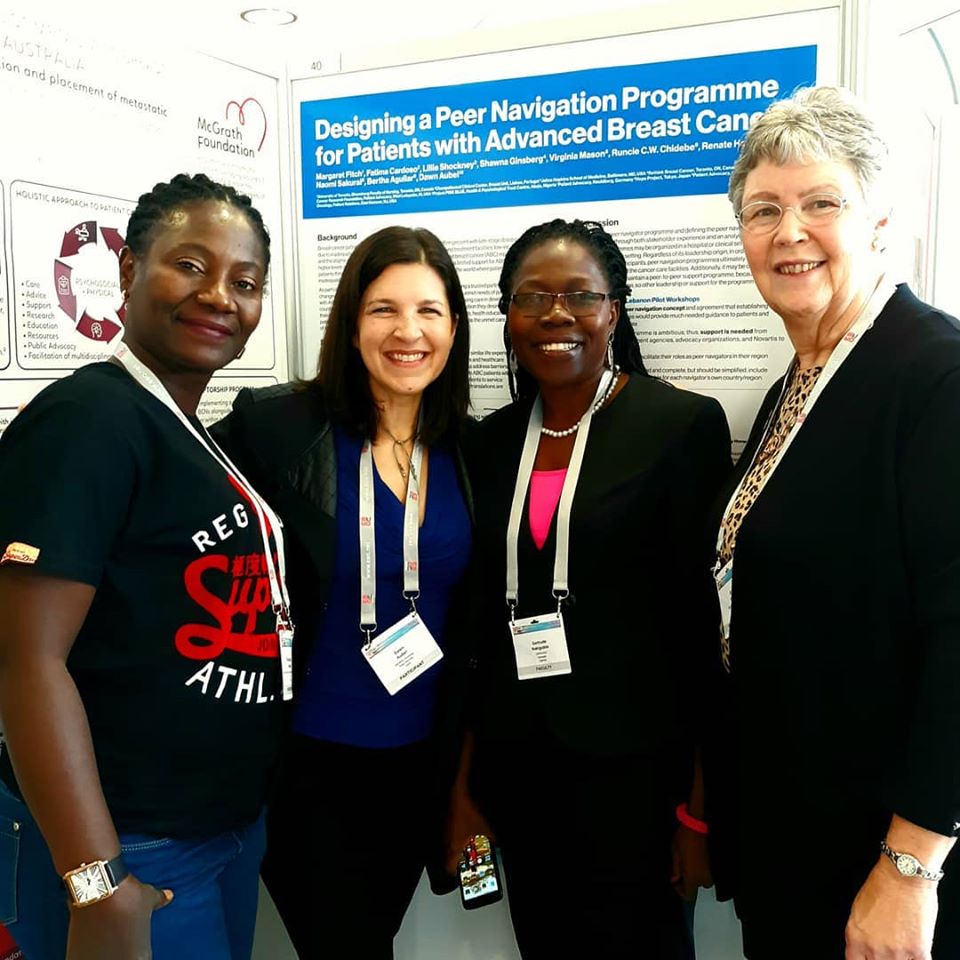
Ginny Mason from the Inflammatory Breast Cancer Research Foundation | Photo: Courtesy of Ginny Mason
He, and a handful of others, wanted to find a way to engage more interest in IBC research. That was also a passion for me. We met Owen in person when my husband and I went to Alaska to celebrate my graduation from college and five years since my IBC diagnosis.
That's when the IBC Research Foundation was officially born! We filed the necessary paperwork to become a 501 c 3, non-profit, in 1999."
What advice would you give to those who are getting treatment for breast cancer at the moment?
"Probably the most important advice given to me was to focus on 'one day at a time.' It can be overwhelming to look at the whole treatment plan.
A friend, in the midst of her second or third recurrence of breast cancer, said that getting through cancer treatment is like eating a train car of Rice Krispies: you do it one spoonful at a time, not looking at how much more there is.
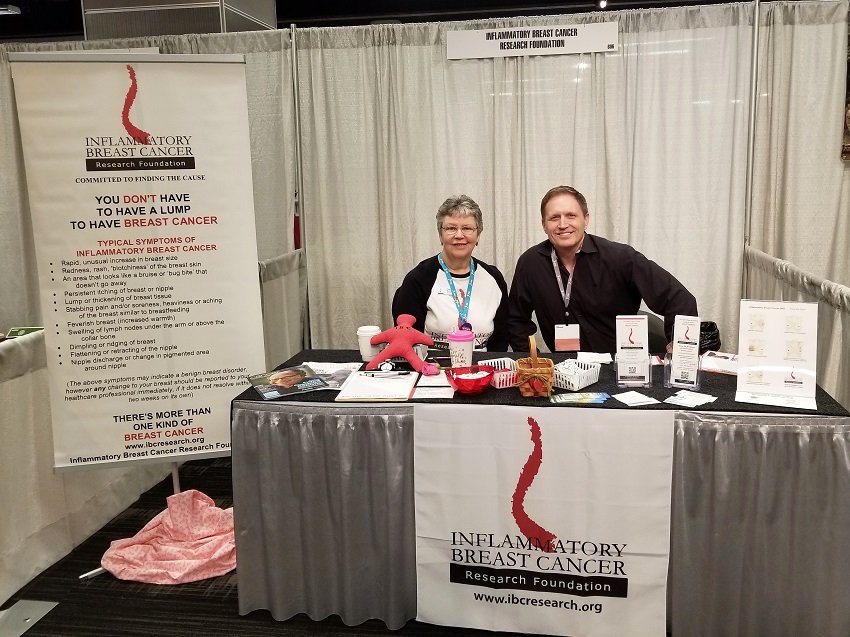
Ginny Mason from the Inflammatory Breast Cancer Research Foundation | Photo: Courtesy of Ginny Mason
Being in treatment for cancer can make you more introspective, your world feels smaller. Just getting through the day can be a huge accomplishment. Family and friends need to understand that and offer help. However, as the patient, you need to learn to accept that help. It is not always easy!!
My husband had to remind me that I'd always liked helping others, and when I refused help, I was stealing the other person's joy. It was a sobering moment, and I learned to say 'thank you' and accept the offer of laundry or getting groceries, etc. We don't have to be super-woman every day."
What are the symptoms of Inflammatory Breast Cancer, and how can women know that it's time to visit a doctor?
"Typical symptoms include a rapid increase in breast size; redness, rash, discoloration or bruised look of the skin; persistent itching; significant warmth; dimpling or thickened areas of skin; pain, aching or heaviness of the breast; skin texture like an orange peel; nipples changes or discharge.
This is not an exhaustive list but rather the most common symptoms patients have reported."
What is the main mission of your foundation?
'To improve the lives of those touched by inflammatory breast cancer through the power of action and advocacy. We do this by fostering innovative IBC research, educating all stakeholders, and tirelessly advocating for both patients and survivors.'
"This is our official mission statement. In practice, our mission is both individual and community-focused. We provide a lot of one on one support while also providing information to the public and medical community."
Tell us more about the programs and activities of your foundation.
"For 20+ years, we've focused on the need for quality, IBC specific research, realizing that educating the public and the medical community is essential as well. We fund research, with the guidance of our Medical Advisory Board, as well as work to develop IBC specific clinical trials and assure the IBC voice is an active part of metastatic breast cancer activities.
Our organization is part of the Metastatic Breast Cancer Alliance, a collaborative effort of many breast cancer organizations to make sure the needs of metastatic patients are addressed."
"Recently we've provided a series of webinars focused on the specific needs of metastatic patients, dealing with the effects of long-term treatment.
Trained volunteers provide one on one support to individuals with worrisome symptoms or questions regarding treatment via phone and internet. Volunteers are active in grant review, collaborative education efforts, working with researchers, and reaching out to the public through social media channels.
As a small, all-volunteer group, we often collaborate with other organizations in order to amplify our reach and have more impact."
What kind of help do you need or accept your foundation right now? How can people volunteer and donate to your foundation?
"As a small, all-volunteer organization, we're always looking for people willing to share their skills. 'In-kind' donations of services such as computer expertise, fundraising, public relations, writing, and such are always welcome.
Of course, financial donations are always welcome and can be made by credit card through our website, by sending a check, or through Facebook on our organizational page."
What else can people do to help?
"Since we're not a member organization, we count on people to share what they've learned with others. Sadly, many physicians aren't familiar with IBC, and it's essential to be your own advocate.
Putting educational brochures in gyms, nail salons, beauty shops, and such are great ways to reach the public. Also, articles in the local press, especially in October, can be helpful in education."
Tell us about the latest achievements and progress in the Inflammatory Breast Cancer treatment research.
"When we started out in the late summer of 1999, we had no idea how complicated cancer could be and the challenges ahead. At that time, almost no one was studying the disease due to the high mortality rate. We found one researcher and focused on helping him in any way we could.
Getting information about clinical trials to patients has always been important, and we've helped develop and implement pivotal trials for drugs like Tykerb. An important achievement was working with the National Comprehensive Cancer Network (NCCN) to have them publish guidelines for the diagnosis and treatment of IBC.
Those guidelines are used in medical school education and help community oncologists when dealing with less common cancers."
"Those guidelines have had a significant impact. In 2019 we worked with the National Accreditation Program of Breast Centers (NAPBC) to provide a continuing medical education program for physicians on the diagnosis and treatment of IBC.
We were all excited to note that nearly 700 participants took part in the webinar! This enduring program is being shared with colleagues in other countries to help educate their medical staff. IBC research remains fragmented due to a lack of funds and limited patients in any given geographic area."
"We are currently working with two other groups to develop a scoring system that will help medical professionals evaluating patients for potential IBC and refer them to a breast specialist in a timely manner.
Currently, 1/3 of IBC patients already have a distant (metastatic) disease at diagnosis. Delays in diagnosis could be one of the reasons for this. It's also important to more clearly define IBC criteria. It remains a clinical diagnosis relying on the subjective view of the person providing the evaluation."
This interview is part of AmoMama's #WomenWithWill. It was created to raise breast cancer awareness and give women a platform to share their experiences. If you are a breast cancer survivor or are dealing with it at the moment and want to tell us your story, please contact us through our email or other social networks.
The information in this article is not intended or implied to be a substitute for professional medical advice, diagnosis or treatment. All content, including text, and images contained on news.AmoMama.com, or available through news.AmoMama.com is for general information purposes only. news.AmoMama.com does not take responsibility for any action taken as a result of reading this article. Before undertaking any course of treatment please consult with your healthcare provider.
